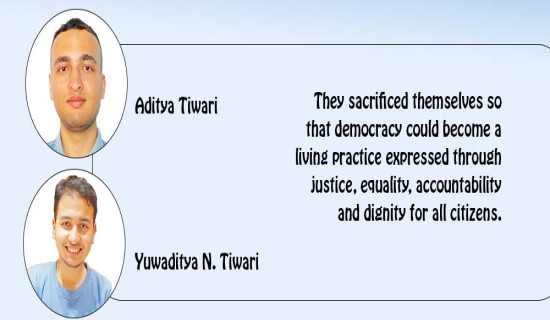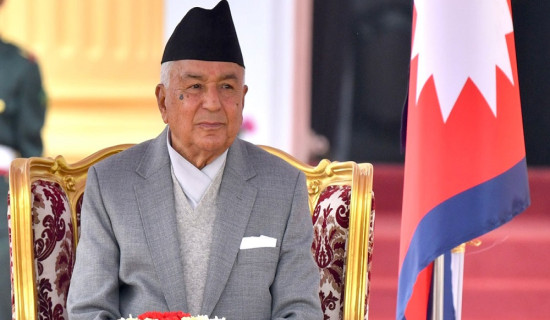- Friday, 30 January 2026
Diaspora Engagement Vital For Development
The perspective towards diaspora has transformed. Traditionally, people couldn't contemplate external migration as a component of national development equations of sending states. Developed nations and the Global North liberalised immigration as they sought human capital. The least developed countries like Nepal endured, sending invaluable resources fueled by numerous push factors, including bad governance. However, the diaspora population today is recognised as a potential partner of development and panacea for underdevelopment.
According to the United Nations, the statistics of global diasporas reached about 281 million in 2020. Their number is increasing. The United States, with the highest number of immigrants, was a global home to about 50.6 million foreign-born residents by 2020. Similarly, India achieves the utmost position of emigrants, constituting about 17.9 million persons of Indian origin and non-resident Indians. The population of non-resident Nepalis (NRN) has skyrocketed, reaching around 800,000 permanent expats in developed countries and about 2-3 million temporary migrants in various nations beyond India.
Partners
The diasporas holding an exceptional affinity towards their homeland have been contributing directly through remittances and charities. The worldwide volume of remittances has exponentially surpassed the official development assistance (ODA), foreign direct investment (FDI), and loans throughout the world. Concerning Nepal, the diaspora population is undoubtedly a savior of Nepal’s economy. The remittance inflows to the country’s GDP by 2020 stood at 24.07 per cent as per the statistics of the World Bank.
The expatriate population has enhanced themselves with talents, proficiencies, educational experiences, and cultural intelligence. Besides blue-collar workers deployed in the Gulf and other regions, NRNs abroad have advanced their academic experiences, achieved professionalism, and boosted their competencies dramatically. Indeed, they have become diverse and dynamic professionals with high resilience skills, team spirit, entrepreneurial aptitudes, and cross-cultural competence. Now, these diasporas are overturning the ´brain drain´ into a ´brain gain´ through soft powers, knowledge, and transfer of skills.
A returnee migrant entrepreneur is an idea pioneer and source of inspiration for society. The diaspora population is a potential investor in capital markets, diaspora bonds, FDI and portfolio investment, and loans. In addition, the diaspora nexus fosters market linkages and business networks, trade promotion, innovation, and research. A soft knowledge network is a reliable information source for the native country. For instance, Nepal can apprehend knowledge including market and trade prospects, labour laws, corporate laws, intellectual property rights, and provisions of technology transfer of different countries through diaspora networks and vice versa.
Diasporas are representatives of their home country's culture and identity. NRNs, particularly, are influential tourism marketers, advocates, and informants of the Himalayas, mountains, and the birthplace of Buddha. Furthermore, the universal role of the diaspora in vvolunteerism and ddisaster rresponse during the COVID-19 pandemic demonstrates them as the first volunteers. Global institutions, multilateral organisations like the UN, WB, ADB, academia, and eminent personalities, experts and professionals have addressed the relevance of diaspora-centred development.
The Constitution of Nepal, 2015 has conceived the utilisation of knowledge, technology, skills, and capital of NRNs for national development. Recognising the necessity of Nepali diaspora professionals around the world, the Ministry of Foreign Affairs established a unit called ‘Brain Gain Centre’ (BGC). The Foreign Policy of Nepal, 2077 B.S. has acknowledged the capacity and competency of Nepali diaspora as a source of the nation’s soft power. It suggests several diaspora engagement strategies, including NRN's association with the BGC and involvement in the promotion and publicity of Nepali culture and heritage.
Despite these provisions, the Government of Nepal has yet to fully institutionalise mobilisation and utilisation of the diaspora's true potential. The concept of NRN citizenship envisioned in the constitution hasn't yet gained the status of implementation with legal grounds. The application of the Identity (ID) Card for NRNs and persons of Nepali origin allowing the diaspora to enjoy various privileges in Nepal have been beneficial though it requires reforms in its scope, procedure, and logistics.
According to the Migration Report 2020 of the Association of Foreign Employment Agencies, about 756,000 recent returnee migrant workers of working age reside in Nepal. Of them, 60 per cent inhabit urban areas. Yet, the huge investment potential of expatriate entrepreneurial networks has remained underutilised. As per the Nepal Rastra Bank (NRB), the nation received more than Rs. 724 billion as remittance in the first nine months of the fiscal year 2021/22. However, most funds undergo unproductive expenditure to meet the daily consumption and imperative needs.
Rooms for improvements
There is room for improvement and enhancement of the policy, programmes, strategies, operational plans, and implementation prospects of diaspora engagement. Nepal needs to formulate adequate and pragmatic brain gain schemes and design agendas for brain incubation. Explicit diaspora strategies should be pursued to partner with them and utilise their significant position for development transformations. The BGC should function proactively to carry out research and study on social, economic, cultural, and technological cooperation and collaboration with the Nepali diaspora professionals globally.
The government needs to adopt a robust diaspora regulatory mechanism to strengthen relationships with expatriate communities and diaspora populations. For instance, the formation of a separate Migration Development Bank can smooth disruptions by decreasing transaction costs and formalising channels of remittance flow. In fact, the commitment of the government, diaspora and stakeholders is essential to harness the diaspora as a reliable partner to accomplish the national aspiration of sustainable peace and prosperity back home.
(A Section Officer at Ministry of Federal Affairs and General Administration, Neupane is a post-graduate student pursuing International Relations at Geneva Business School.)










-original-thumb.jpg)

-original-thumb.jpg)
-original-thumb.jpg)


